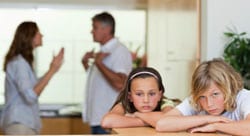
I recently read a book called “Between Two Worlds: The Inner Lives of Children of Divorce” by Elizabeth Marquardt. The author, a child of divorce herself, conducted a study involving 1,500 young adults from around the country between the ages of 18 and 35 years old. Half of these people’s parents divorced before they were 14 years old. The other half grew up in intact families.
The author also conducted 71 in-person interviews with people in the same age group in four different cities. The author claims that her study shows that children from amicable, low-conflict divorces are less well adjusted than children from unhappy, low-conflict marriages. In other words, the parents’ happiness does not equate to the children’s happiness, despite what other experienceds tell us. Children do better when their parents stay together- period. She urges married persons experiencing marital discord to work it out for the good of the children.
At the very least, we need to acknowledge the suffering of all children of divorce- even the ones that end up successful in spite of the divorce and even the ones whose parents engaged in an amicable co-parenting relationship after divorce. We need to stop promoting the idea of divorce on the basis that children are resilient. In her book the author describes the inner conflict that children of divorce experience, giving us insight into the lives of the people she interviewed in person and drawing on her own personal experiences as well.
She talks about the loneliness, separateness, fear and secretiveness that children of divorce feel. The author is clearly convinced that divorce is bad for children regardless of whether the parents can remain amicable after the divorce. She claims that divorce “happy talk” is pretty much nonsense. She even balks at the idea of trying to portray the “blended family” as anything more than a substandard alternative to the original intact family. In her conclusion she levels a blow at the idea of joint physical custodial arrangements- despite the fact that her book seemed to focus on people who grew up in primary physical custody situations.
I read this book with an open mind. I was attempting to gain some insight into what my own children (bio-daughter and stepson) might be going through as children of divorce. I agree with her observation that children of divorce are left to make sense of their parents’ differing worlds and must try to fit into both worlds, which can be a very difficult task regardless of the level of conflict between households. However, I believe that after divorce it is the parents’ job to find a way to work together to reconcile the two worlds for the children.
Parents should be actively involved in their child’s life regardless of whose parenting time it is. Parents should get along and present a united front for the good of the children. Parents should sit down and work out an arrangement focusing on consistency between households (i.e. bedtimes, homework routines, privileges, discipline, etc.) Many divorced parents fail at this important task, but some do succeed and I think “happy talk” allows us in the field to be optimistic about the future of co-parenting. Just because most people don’t engage in appropriate co-parenting does not mean we should stop encouraging it.
When talking about her own childhood, the author puts herself in the group of children from divorce that experienced a “good divorce” and yet, she has all of this childhood baggage she is trying to sort through. What you learn about the author through the course of the book is that she went through quite a bit in her childhood, which I would not associate with a “good divorce.” When she was a child she was forced to travel great distance between homes as her parents lived several hours apart from one another-her mother in the country and her father in the city. She traveled by herself on an airplane for visits with her father. She lived primarily with her mother. Both parents remarried twice after their divorce. One of her step-fathers, with whom she was very close, committed suicide when she was a child. She was forced to be alone a lot at night while her mother was trying to better her career options. She took care of her little brother during these times. She felt like an outsider at her father’s home where her step-mother and step-sisters also lived. These are all traumatic experiences, but it is short-sided to suggest that these are experiences that all children of divorce go through.
I agree that any child forced to go through these events would be damaged. However, is this due to the divorce itself or rather is it a product of parents that were not really attuned with their child? I suspect that if her parents had not lived so far apart, had not remarried so many times and had made sufficient efforts to effectively blend the second families she may not have had such a bad experience. Any child who suffers the loss of a parent (step or otherwise) experiences grief. Regardless of the family dynamics (intact or severed), when parents are not attuned with their children’s needs, the children suffer.
All of my clients are concerned with how the divorce is going to affect their children. I am always frank when I tell them that it is going to be difficult for the children- no way around it. But make no mistake, no person gets out of childhood unscathed. The divorce will likely be what the children point to as the difficult event in their childhood. Even children from intact families have difficult times in childhood to blame for unhappiness. That is just the way it is. I saw a movie once where one of the characters says “childhood is what you spend the rest of your life trying to get over”- and that is the truth whether your parents stay together or split up. Life struggles are what make you an interesting person.
If your parents are divorced, you probably learned some difficult life lessons. If you got divorced, you learned some too. I think this book is well written and it presents an interesting viewpoint. If you think your marriage has a chance, then it may be something to consider. I won’t, however, recommend it to my clients that are already in the process or have completed it. They are going through one of the most painful experiences of their lives—they don’t need the guilt that this book will make them feel.
Review by Jessica H. Anderson
Divorce Attorney Reno, NV
